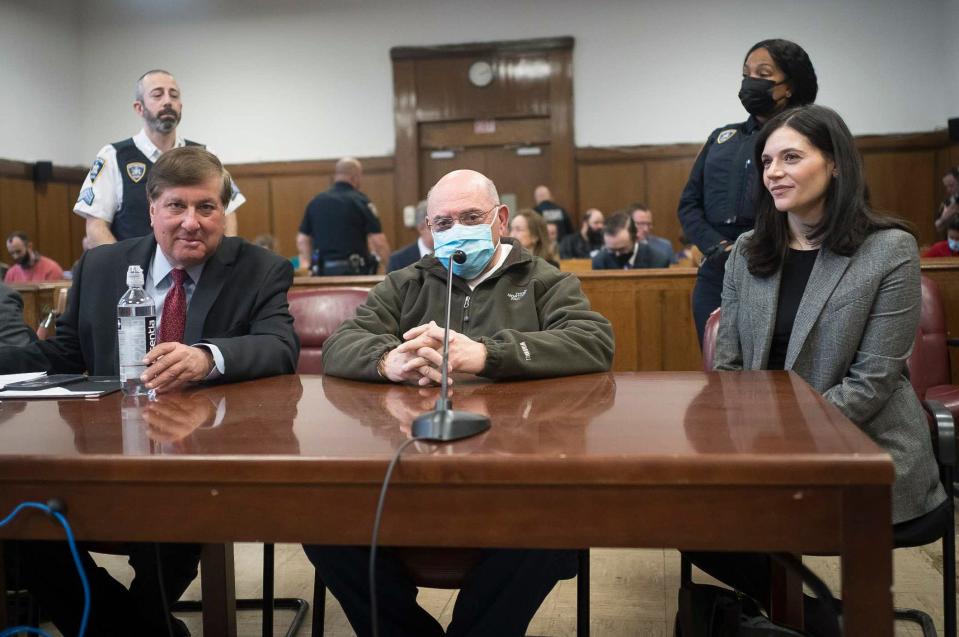Two Trump companies sentenced to pay $1.6M after criminal tax fraud convictions
NEW YORK – Two of former President Donald Trump's namesake companies were sentenced Friday to pay $1.6 million after last month's guilty verdicts on tax fraud charges that scarred his business empire with criminal convictions.
The Trump Corp., which was convicted of nine felonies, was sentenced to a maximum fine of $810,000. The Trump Payroll Corp., which was convicted of eight felonies, was sentenced to a maximum fine of $800,000.
The sentencing came days after former Trump chief financial officer Allen Weisselberg was sentenced to five months in jail for similar tax fraud counts and other charges. The sentence was far lower than the maximum 15-year prison term he had faced because Weisselberg pleaded guilty to all charges in August and then testified against the Trump firms in an agreement with prosecutors.
The Trump Organization said in a statement that it did nothing wrong and would appeal the verdict.
“New York has become the crime and murder capital of the world, yet these politically motivated prosecutors will stop at nothing to get President Trump and continue the never ending witch-hunt which began the day he announced his presidency,” the statement said.
Manhattan District Attorney Alvin Bragg, whose office prosecuted the firms, said the maximum fines resulted from Weisselberg and the two companies conducting sweeping fraud and benefiting from it for more than a decade.
"While corporations can’t serve jail time, this consequential conviction and sentencing serves as a reminder to corporations and executives that you cannot defraud tax authorities and get away with it," Bragg said in a statement. "Today’s sentencing of The Trump Corporation and The Trump Payroll Corp. represents a significant chapter of our ongoing investigation into the former President and his businesses.”
The penalties hit the companies that are divisions operating under the Trump Organization corporate umbrella.
Trump was not charged in the case and did not appear in the courtroom during the trial. However, the outcomes, combined with other state and federal investigations, shadow his recently announced third campaign for the White House.
It is uncertain whether the convictions and penalties will have a significant impact on Trump's businesses. But the outcome is "awful" symbolically, Andrew Weissmann, a former federal prosecutor who worked on special counsel Robert Mueller's investigation of Russian interference during the 2016 presidential election, told USA TODAY after the verdicts.
The case stemmed from an indictment that accused the Trump firms of doling out company-paid perks – including expensive Manhattan apartments, luxury automobiles and even cash to pay year-end holiday tips – to Weisselberg and other top Trump company officials.
The executives repeatedly failed to declare the perks on their tax returns, trial evidence showed. The practice of giving out these benefits kept the executives satisfied while enabling the Trump companies to avoid paying salary hikes and to benefit from lower taxes on the employer share of Medicaid taxes, the evidence showed.
Defense lawyers argued that Weisselberg secretly orchestrated and benefited from the scheme while keeping Trump and others in the dark. Weisselberg did it for Weisselberg, they repeatedly told jurors.
Weisselberg's testimony appeared to help both the defense teams and prosecutors. He testified that he used the scheme largely to reduce his federal, state and city tax burdens – but also acknowledged the maneuvers produced lower executive salaries and tax benefits for the companies.

That appeared to be enough for jurors to conclude that the scheme met New York penal law requirements for finding corporations guilty of a crime. The statute requires evidence that the offense was committed by or involved "a high managerial agent acting within the scope of his employment and in behalf of the corporation."
Acting Manhattan Supreme Court Justice Juan Merchan, who presided over the much-watched trial, instructed jurors that if the agent's actions "were taken merely for personal gain, they were not in behalf of the corporation."
The judge also told jurors "it is not necessary that a criminal act actually benefited the corporations."
Separately, prosecutors argued that evidence proved Trump was or should have been aware of the scheme. They introduced evidence that showed Trump had initialed one of his executive's decisions to cut his salary by the same amount as the value of a company perk. Other trial evidence showed that the tactic helped enable tax fraud.
Prosecutors went further during closing arguments, arguing that trial evidence showed Trump had been "explicitly sanctioning tax fraud" through his companies' corporate culture.
The jury of eight women and four men returned guilty verdicts on all charges following less than two full days of deliberations.
Contributing: The Associated Press
This article originally appeared on USA TODAY: Trump firms sentenced to pay $1.6M after tax fraud convictions
